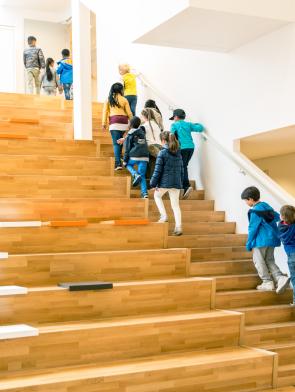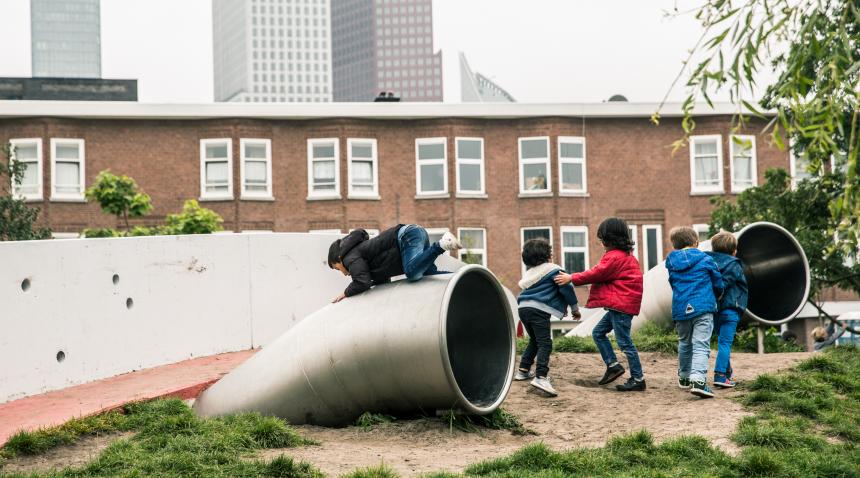
Secondary education
Group 8 is the final year of Dutch primary school (ages 11-12). Pupils then leave primary school for secondary school ('middelbare school'), and to follow secondary education ('voortgezet onderwijs').
The assessment of the teachers at primary school, as well as a standardised test score (CITO), will lead to a school recommending 1 out of 4 levels in secondary education:
- Practical education ('praktijkonderwijs')
- Pre-vocational secondary education (VMBO)
- Senior general secondary education (HAVO)
- Pre-university education (VWO)
Pre-vocational secondary education (vmbo)
Pre-vocational secondary education (VMBO) is a 4-year programme offering theoretical and practical courses. Pupils in years 1 and 2 follow a general curriculum. At the end of the second year, pupils choose an occupational sector with a view to further vocational education and training, and their future jobs.
For pupils who can learn a trade, but for whom VMBO is too difficult, there is also practical education (‘praktijkonderwijs’).
Senior general secondary education (HAVO)
Senior general secondary education (HAVO) prepares pupils for higher professional education (HBO). The course takes 5 years. In the first three years, all students follow a general curriculum. The following subjects are compulsory for all pupils in the upper years (years 4 and 5):
- Dutch
- English
- Physical Education
- Culture & the Arts
- Social Studies
Pupils also choose one of 4 subject combinations:
- Science and Technology
- Science and Health
- Economics and Society
- Culture and Society
Pre-university education (VWO)
Pre-university education (VWO) prepares pupils for university studies, and takes 6 years. In the first three years, all VWO pupils follow a general curriculum. The following subjects are compulsory for all pupils in the latter years:
- Dutch
- English
- Physical Education
- Culture & the Arts
- Social Studies
- Mathematics
- A second foreign language
Pupils also choose one of 4 subject combinations:
- Science and Technology
- Science and Health
- Economics and Society
- Culture and Society
Registering your child at a Dutch secondary school
You will receive a form with a recommended educational level for your child ('BOVO-aanmeldformulier') during their final year at primary school.
You may then make a list of approximately 5 preferred secondary schools, which you can list on the registration form. The form can be handed in at your first-choice school (an appointment may be needed).
You'll then find out the final decision a few months later.
Some schools receive more applications than there is availability. These schools work with a maximum number of new students. In The Hague, Rijswijk and Leidschendam-Voorburg (BOVO Haaglanden) schools may give priority to children:
- That already have a brother or sister at the school
- That go to a particular partner primary school
- Whose parent works at the school
If you wish to register your child at a school, the school will need the data on your child’s identity document data (including a BSN number).
The registration procedure for international secondary schools may differ per school. If you are interested in having your children attend an international school, please contact the school directly for more information.
- Read more about Dutch secondary education on the Dutch government’s website.
- Find secondary schools in The Hague, Rijswijk and Leidschendam-Voorburg (in Dutch).
- Find secondary schools in Delft (in Dutch).
Bilingual secondary schools
Several Dutch secondary schools in The Hague region will offer a bilingual programme for your child. This is called ‘Tweetaling Onderwijs’ (TTO, or bilingual education) where a number of subjects are taught in English. This often includes history, geography, maths; physics, biology, chemistry; economics, IT, arts; music, physical education and the mentor class are taught in English. Students are also offered a large choice of international activities, such as exchange programs with schools abroad.
For students at TTO schools, English quickly becomes a natural second language for Dutch students. Meanwhile, international students will have the benefit of learning the Dutch language in an accessible environment.
Please note that final exams will be in Dutch for all students. This form of education spans the complete 6 years at the VWO-level. Bilingual students also have the opportunity to get the internationally recognised International Baccalaureate English A2 Certificate. A successful result qualifies students to enrol at English-speaking universities.
International Secondary Schools
There are also various types of International Secondary Schools available in The Hague region. You can see our information pages on them here: Government funded International Schools, Private International Schools, Foreign Schools. You may also be interested in our information page on special needs education.







